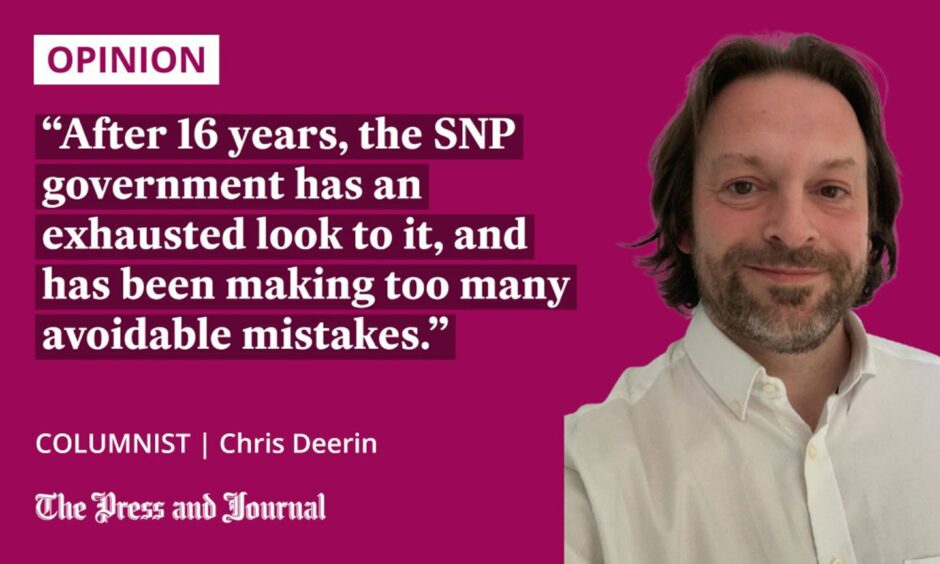There is little immediate prospect of independence and the SNP needs to rebuild patience with the hard work of building a better Scotland, writes Chris Deerin.
Patience, it’s said, is a virtue. It’s also a word I’m hearing a lot in SNP circles in relation to the party’s strategy for winning Scottish independence.
In fact, it’s quite hard to have a conversation with a nat at the moment without them fixing you with what they hope is a knowing, persuasive stare and insisting that “we’ll get there, but we need to show greater patience.”
Well, hear hear. But there’s patience and there’s patience. It strikes me that the word means something rather different to unionist and swing voters than it does to those already convinced of the cause.
An example. Stewart McDonald, the MP for Glasgow South and one of the SNP’s more thoughtful souls, published a pamphlet shortly before Nicola Sturgeon’s resignation arguing against her plan to use the next general election as a de facto referendum. “We do not want to be the generation that blew it because of our own impatience,” he wrote.
“Our current deliberations seem to be confined to seeking a way to resolve the constitutional question as quickly as possible, taking little consideration of where public opinion stands.”

SNP administration has a fag-end feel to it
What is his alternative? A campaign to build support for independence, a commitment to a referendum as the centrepiece of next year’s general election manifesto, and then, presumably, the holding of said referendum as soon as possible.
There is much talk among the candidates to replace Nicola Sturgeon about the need for a “reset”. After 16 years, the SNP government has an exhausted look to it, and has been making too many avoidable mistakes, from the de facto proposal and the cataclysmic handling of the gender reform bill to the unpopular new bottle return scheme and plans for a ban on alcohol advertising.
It’s hoped that a replacement leader, a fresh face with a new agenda, can breathe life into an administration that has a fag-end feel to it. Those policy areas that have been neglected under Sturgeon – restoring growth to the economy, reforming education and health systems that have been left to wither on the vine – will apparently be at the centre of this agenda. In theory, this will reconnect the SNP to an increasingly disgruntled electorate, who will then be more open to the idea of leaving the UK.
Has Scottish Labour comeback begun?
But there’s a contradiction here, and it comes back to that word patience. Meaningful reforms, the kind that bring worthwhile, measurable improvement, take years to work. They involve dust-ups with the public sector unions, often an initial period of public unpopularity, and the spending of political capital – the capital Sturgeon was so keen to store for a second referendum. A significant boost to economic growth will only come through a mix of improvements to the global economy, an end to the war in Ukraine, the return of business confidence and some clever, targeted public policy.
Anas Sarwar, the Scottish Labour leader, made a direct appeal to SNP voters in the wake of Nicola Sturgeon’s surprise resignation as a new poll put Labour within three points of the nationalists https://t.co/ISV1IfT8TM
— The Times and The Sunday Times Scotland (@timesscotland) February 18, 2023
None of this, even if it does come about, is going to happen quickly. And, worse for the SNP, Labour will soon be in government at Westminster, while the polls suggest a Scottish Labour comeback has finally begun.
Independence referendum never seems to get any closer
The leadership contest itself has been a nasty affair from the off, with allegations being flung against the two leading candidates about their positions on gay marriage and their fitness for the top job. This is often the nature of these things, but divided parties do not tend to impress voters.
And then there are the polls. The most common position on a second referendum is that yes, there should be one, but not for between three and five years. This horizon never seems to draw any closer – voters have had much the same timescale in mind since 2014. What would make them change their minds?
It’s unlikely to be the new leader, whoever they are. Is the broad mass of Scotland going to take a look at whichever successful candidate comes limping and bedraggled from the scrap and think, now’s the time to make the leap? If Sturgeon, that wizard of gigantic election victories, couldn’t get support over 50 per cent, far less to the preferred 60 per cent, what chance does someone like Humza Yousaf stand?
Patience matters when it comes to building a better Scotland
This is why one’s definition of patience matters. For all the jazzy rhetoric about a new start, it seems the SNP still adheres to the view that Scotland will be independent shortly after the next general or devolved election. I suspect this is mainly for public consumption, and that there’s a more realistic internal understanding of the scale of the challenge that faces the party.
But voters are not stupid and can detect cognitive dissonance. True patience requires the slow, hard work of building a better Scotland, not through passing showy legislation intended to emphasise how much more cuddly and liberal Scots are than the English, but by teaching our kids properly, healing our sick in timely fashion, and helping to build opportunity and vibrancy in the jobs market.
📣 Bernie Sanders on Scotland: “They want to go their own way, they should be allowed to”.
🏴 Scotland’s future is up to the people who live in Scotland, not Westminster politicians.
🤝 Get involved and help us stand up for democracy: https://t.co/bkLETLnJTB pic.twitter.com/jEcKVfKMyv
— Yes (@YesScot) February 27, 2023
The truth is that there is little immediate prospect of independence. Would Sturgeon really have walked if freedom was nearly upon us? The SNP have had a long go, and have blown it. A more honest conversation would mean admitting this to their supporters, and resetting expectations for the long haul.
But then, as Julius Caesar had it, “it is easier to find men who will volunteer to die, than to find those who are willing to endure pain with patience.”
Chris Deerin is a leading journalist and commentator who heads independent, non-party think tank, Reform Scotland


Conversation